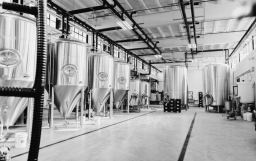

The global conversation around sustainability is no longer confined to activists or environmental organizations—it has become a priority across industries. One sector making significant strides is brewing, where companies are rethinking how they source ingredients, package products, and manage waste. Beer is more than just a beverage; it represents culture, tradition, and community. With growing awareness about climate change and environmental impact, breweries are now putting sustainability at the center of their business models. This shift not only benefits the planet but also strengthens brand loyalty among eco-conscious consumers.
When you think of a brewing company, you may first picture hops, barley, and bubbling tanks of golden liquid. But behind every pint lies a complex supply chain that can either contribute to environmental problems or provide solutions. From the energy-intensive brewing process to packaging and transportation, breweries leave a significant carbon footprint. This reality has motivated many companies to innovate and adopt green practices. Today, large-scale and craft breweries alike are investing in renewable energy, sustainable farming partnerships, and circular packaging systems to reduce their ecological impact.
One of the earliest steps toward brewing sustainability begins at the farm. The quality of beer depends heavily on ingredients like barley, hops, and yeast. Many breweries are now partnering with local farmers who prioritize regenerative agriculture. These farming practices restore soil health, conserve water, and reduce the use of chemical fertilizers and pesticides. Some breweries even grow their own ingredients on-site to minimize transport emissions and maintain transparency.
For example, certain craft breweries in the U.S. and Europe have embraced organic hops, while others experiment with heirloom grains that require less water to cultivate. By diversifying their supply chains, they reduce dependence on resource-heavy monoculture crops, paving the way for a healthier ecosystem.
Energy consumption is one of the largest sustainability challenges in brewing. Brewing requires significant heat for boiling, cooling systems for fermentation, and constant refrigeration to keep products fresh. To address this, many companies are investing in renewable energy sources such as solar panels, wind turbines, or biogas systems that convert brewing waste into usable power.
Some breweries now proudly operate as carbon-neutral facilities. For instance, installing solar arrays on rooftops or purchasing renewable energy credits has become standard among environmentally conscious brands. This not only reduces greenhouse gas emissions but also lowers operational costs in the long run, making it a win-win solution.
Water is beer’s most important ingredient, making conservation a priority. On average, it takes about seven gallons of water to produce one gallon of beer. This high ratio has pushed breweries to innovate in wastewater recycling, rainwater harvesting, and advanced cleaning systems that reduce water use without compromising hygiene.
A growing number of breweries now recycle their wastewater to irrigate crops or generate biogas. Some even install precision systems that track water use at every stage of brewing, ensuring efficiency and accountability. By doing so, breweries help preserve local water supplies for surrounding communities and ecosystems.
Another area of focus is packaging, which historically has relied heavily on single-use plastics and resource-intensive materials. Breweries are rethinking this by adopting biodegradable six-pack rings, lightweight aluminum cans, and refillable glass bottles. Many craft breweries also run “growler refill programs,” encouraging customers to reuse containers instead of buying new packaging each time.
Aluminum cans, in particular, have become a popular sustainable option because they are lightweight, easy to transport, and infinitely recyclable. Meanwhile, biodegradable packaging solutions are gaining traction among small breweries eager to showcase their environmental values.
Brewing generates a large amount of byproducts such as spent grains, yeast, and wastewater. Instead of sending this waste to landfills, many breweries are embracing circular economy models. Spent grains, for example, can be repurposed as livestock feed, compost, or even ingredients in baked goods and snacks. Some breweries collaborate with local businesses to create eco-friendly products like dog treats made from spent barley.
This not only reduces waste but also builds community partnerships and expands the brewery’s brand story. Customers love supporting businesses that demonstrate creativity and responsibility in managing resources.
Beyond internal changes, breweries play an important role in educating consumers about sustainability. By offering eco-friendly packaging, promoting refill programs, or hosting sustainability-focused events, breweries inspire customers to adopt greener habits themselves. Transparency also builds trust—when breweries share data about their environmental initiatives, consumers feel more connected to the mission.
Breweries often lead by example, proving that small actions like switching to energy-efficient lighting or composting food waste can create ripple effects across industries. Their efforts show that businesses don’t have to sacrifice quality or profitability to prioritize sustainability.
While sustainability is essential for the planet, it’s also smart business. Consumers increasingly prefer brands with eco-friendly values, and many are willing to pay a premium for products that align with their ethics. Breweries that adopt sustainable practices not only attract loyal customers but also cut operational costs through energy efficiency, waste reduction, and water conservation.
Moreover, sustainability opens doors to new partnerships and government incentives. Many regions now offer grants, tax credits, or recognition programs for businesses that reduce their carbon footprint. This creates an ecosystem where breweries thrive financially while contributing to environmental goals.
The brewing industry is proving that sustainability and tradition can go hand in hand. From sourcing regenerative ingredients and conserving water to innovating packaging and generating renewable energy, breweries are embracing green practices with remarkable creativity. Each pint brewed sustainably represents a step toward a healthier planet and a stronger connection between businesses and communities.
As consumers raise their glasses, they are no longer just enjoying a drink—they are supporting a movement. The next time you sip a craft beer, consider the story behind it. Chances are, your favorite brewing company is already making strides toward a greener future, one sustainable pour at a time.
| No comments yet. Be the first. |